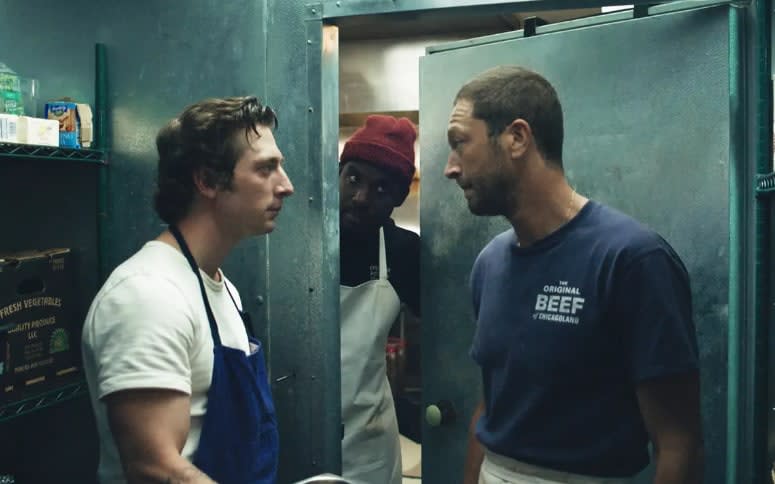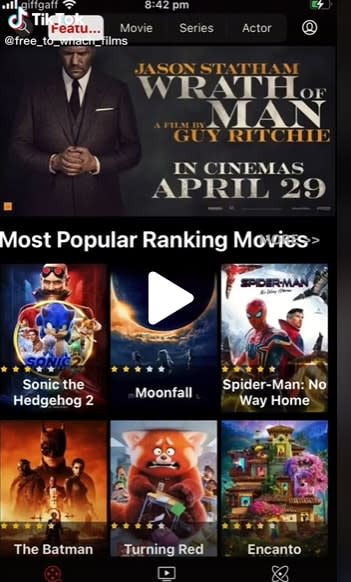‘Free is free’: inside the UK’s film and TV piracy boom

There’s nothing new about piracy. We all know someone who’s bought a dodgy DVD down the pub. But a combination of rising living costs, increasingly fragmented, walled-off legal options, and easy-access illegal services has set the stage for a boom in less-than-honest consumption.
In a choice between seven-pound Lurpak and a tenner-plus streaming service, it seems people are opting to have their bread buttered. Research by Kantar has revealed that as many as 1.66 million TV and film streaming subscriptions have been cancelled in the past three months alone. For a third of people switching off, the looming spectre of sky-high energy bills was the deciding factor.
Netflix had shed almost a million paying customers in the past three months to what's become known as “subscriber fatigue”. And Amazon Prime subscribers (who, until now, got rapid deliveries, music streaming, and access to thousands of movies and TV shows for £7.99 a month) recently threatened to cancel en masse following a £1 monthly price hike.
According to Kantar’s report, Gen-Zers are the most likely to cut ties, lured back to free offerings from ITV, Channel 4, and the BBC – as well as the endless stream of distraction to be found on TikTok.
For everything else, there are pirate sites. Particularly when it comes to buzzy new shows which are released in America to rave reviews before taking months to launch in the UK – Hulu’s critically beloved restaurant drama The Bear, for example, or the second season of HBO’s Industry (despite it being a BBC production). Or blockbuster films such as Jordan Peele’s twisty sci-fi Nope – released in the US on July 22, meaning its secrets were plastered all over the internet weeks before the UK release on August 12.

Data company MUSO tracks the web for views, streams, and downloads of illegally distributed content, including films, TV shows, live sports, and comics. In 2021, the firm measured over 182 billion visits to piracy sites – a 15.2 per cent increase on the previous year. The UK appears in the top 10 overall for the number of visits, and in the top five for TV-specific piracy, which includes live sports.
According to MUSO, TV is the most pirated form of entertainment, followed by publishing (a sector dominated by manga comics popular with young people), and then film, which is streaking a comeback in the piracy stakes as more Covid-delayed blockbusters make their way out of studios. In fact, MUSO’s research has suggested that the Covid-spurred decision by movie studios to push their new releases straight to streaming, rather than letting the linger in cinemas, has meant new movies appearing in HD on pirate sites much more quickly. Streaming releases Godzilla Vs Kong, Zack Snyder’s Justice League, and Black Widow were 2021’s most-pirated movies, per a report by tech firm Akamai, with Loki, WandaVision, and the fifth season of Rick & Morty topping the TV tables.
The government’s Intellectual Property Office tracks how people in the UK are accessing pirated content online. Its most recent report, published in December 2021, found that illegal streaming is the go-to method, and that overall levels of piracy remain roughly the same year-on-year. “The main drivers for online consumption,” the report says, “were the choice/variety of content on offer, being able to access it immediately, and the cost” – neatly summarising the challenge faced by Netflix, Amazon et al.

Eddy Leviton, COO at FACT, the intellectual property protection organisation whose demonic anti-piracy ads trailed DVDs in the 1990s and 2000s, says that people pirating films and TV shows is a direct threat to the existence of the creative industries. “Without people paying for content in some form or other, whether that's subscription or ad-funded or whatever,” he says, “content doesn’t get made. The musicians, songwriters, actors, set designers, technicians, don't get paid unless there’s a funding model that works.” There is, says Leviton, “no such thing as free.”
That message doesn’t appear to be getting across to the millions accessing movies and TV shows without paying. “Free is free,” says Nick (16, not his real name), “and 10 pounds is a lot of money.” At home, Nick has subscriptions to Netflix, Sky, and Disney+ via a combination of password-sharing and his mum paying. But when any of those providers doesn’t have what he’s looking for, or when certain shows or films disappear from legitimate services, he’ll stream illegally rather than shelling out for a rental. He’d rather save his money, or spend it on seeing his friends.
Nick’s first experience of pirating was buying a DVD from a woman in a Wetherspoon’s. “They’d come with their little trolley with stacks and stacks of DVDs,” he remembers, a glimmer in his eye. “The first one I got you could see the outline of the screen where they were filming it in the cinema, but all the ones after that were really good.”
DVDs in plastic sleeves were replaced by torrent sites and peer-to-peer file-sharing networks that required special software, patience, and a degree of faith every time the user opened their downloaded file – would this, finally, be the virus that destroyed your computer? Or would you be watching, say, The Phantom Menace in peace?
Illegal streaming sites followed (ahead of, Leviton notes, most of the legal options). As broadband speeds increased, these sites established themselves as the most popular option – thanks in part to the ease with which they can be accessed via a simple Google search, and neat features like being able to cast from your laptop to a TV.
Today, Nick has an app on his phone that gives him access to a brimming catalogue of the latest TV shows and movies, with none of the irritating pop-ups and ads that plague most illegal streaming sites. He found out about it on TikTok.

He has an eye for quality. He knows to avoid “cams” (movies filmed in the cinema using a phone or video camera) and won’t use sites or apps that require any personal details or payment information. He is, he says, typical of his generation in this respect: almost all of his friends and classmates use similar apps.
Once a new app picks up steam on TikTok it’s usually only a matter of time before it gets nuked from stores. “But if it gets shut down, they’ll just make another one,” says Nick, whose home screen is a small graveyard of busted apps.
Simran (18, not her real name) has seen the apps shared on TikTok too. She shows a post from an account called “free_to_whach_films” advertising the service: it’s a screenshot video scrolling through a vast digital library designed to look just like the easy-to-browse catalogues of Netflix and Amazon Prime.
Simran says she doesn’t use pirate sites, or the apps she sees on TikTok, mostly because she has already access to the majority of streaming services, either through her family accounts or shared passwords. The legal ones are easier to use, she says. Her brothers, aged 15 and 16, use websites and dongles to watch football matches and stream anime. But Simran notes that her privileged upbringing likely puts her outside of the norm for most kids her age.
It’s far from just the Gen-Z cable-cutters who have a penchant for piracy. At broadband’s dawn in the early noughties, more than half of people accessing content illegally online were teenage boys. By 2018, however, a University of Amsterdam study found that 36 per cent of UK pirates were over 35 – suggesting that teenage habits die hard.
The app Nick uses is, at the time of writing, still available to download from Apple’s App Store. A search for it throws up multiple suggestions for other bogus apps with similar names. While clearly illegitimate, and remarkably easy to discover, these apps are difficult to police, says Fact’s Leviton. Most of the apps simply point towards existing illegal streaming sites, which means they’ll continue to function on people’s phones even after being taken down from app stores.
Tackling piracy is a Sisyphean task. Years of work and stacks of public money went into shutting down popular torrent site The Pirate Bay. Yet it still exists in countless forms through a sprawling network of proxy sites – and has, for most purposes, been surpassed by demand for on-demand streaming anyway.
Leviton is resigned to the fact that, try as he and his colleagues might, they’re never going to stop piracy entirely. But their approach has changed in recent years.
The iconic 2004 public information film that compared watching pirate DVDs to stealing cars and handbags (later skewered in Channel 4 sitcom The IT Crowd, with lines like “You wouldn’t steal a baby” and “You wouldn’t shoot a policeman and then steal his helmet. You wouldn’t go to the toilet in his helmet and then send it to the policeman’s grieving widow. And then steal it again!”) took a heavy-handed, accusatory tone that Leviton suggests would find less favour today. Instead, he thinks the focus should be on educating people on the knock-on effect of knock-offs, and the need for studios to make money if they’re going to keep making shows and movies. Landing this message remains a challenge.
“It’s not as if everyone is using the [piracy] apps,” says 16-year-old Nick, pointing out that he’s among the 56 per cent of households in the UK who have at least one paid-for streaming service. He sees streaming platforms’ undimming desire for growth and user acquisition as driven by greed, and fuelled by quick cash-grabs. “We’re not gonna feel bad for a multimillion dollar studio are we,” he says.
In recent years, the music industry has witnessed an overall decline in piracy. The ease-of-access provided by streaming has garnered much of the credit for this, but the data divers at MUSO say that, more specifically, it’s a result of the industry’s decision not to hive off releases as exclusive content for certain streaming platforms. This is something that the likes of Netflix and Amazon Prime are yet to come around to, choosing instead to splurge billions of dollars on in-house productions that will live on their platforms alone – whether anyone is logging in to watch them in the future or not.
The same applies to limited geographical options. Despite the touted global reach of Netflix, Amazon and the big US movie studios, official release dates in different countries rarely line up. So if you don’t want to wait months to watch that buzzy new US drama or the Oscar shoo-in you just read about online and you're especially impatient, then an illegal site can be hard to resist. The problem for streamers is that this is commonly down to boring, complex, often outdated licensing issues that most viewers either don’t understand or, more likely, don’t care about.
The bigger worry for anti-piracy advocates, perhaps, is that the argument has already been lost. Once you establish a norm of something being widely available for free – be it TV, music, or movies – it becomes very hard to go back to a status quo in which people pay for these things that often cost a lot of money to make.
“There’s a lot more work that needs to be done,” says Leviton. He’s confident that the market will adjust. But increasingly those adjustments, like ad-funded free services with limited catalogues, put the pirates and the paid-for closer together; and as Nick says, “why would I pay for something if I can get it for free?”

